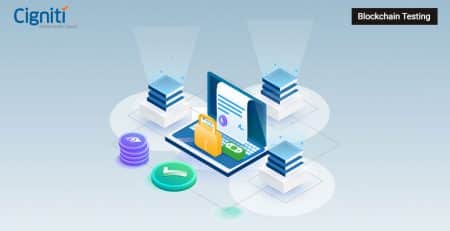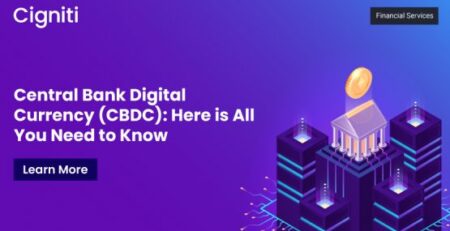12 Industries that need Blockchain Testing for their next phase of growth
Why is Blockchain Testing critical?
To be successful, organizations are looking for secure, seamless, and robust platforms using which they can transparently share information and build absolute trust.
Blockchain is the answer to the challenge. A Blockchain is expected to do two things – gather and order data into Blocks, and then Chain them together securely using cryptography. The following image describes the activities that go on behind the scene.
However, blockchain adoption comes with a few inherent challenges – integration issues with legacy systems, high energy consumptions, high initial investments, privacy and security issues, and initial apprehension around the adoption process. To help organizations overcome these hiccups, testing blockchain apps becomes business-critical.
How is Blockchain enabling various industries
Per a report by the International Data Corporation (IDC), the calculated global spend on blockchain will hit a whopping $9.7 billion by 2021.
Blockchain is helping transform businesses by providing a means to share information and track assets safely and collaborate better. The benefits of blockchain – precision, security, and efficiency – are today being enjoyed by multiple sectors and domains, such as finance, healthcare, retail, and more. The Blockchain technology is also being used by Governments to create, validate, and improve people’s access to self-sovereign (international ID) identities.
As Blockchain paves the way for innovations across industries that will eventually impact our day-to-day lives, it becomes imperative for organizations to pay heed to the quality and testing needs of these technologies. With so many Blockchain applications being launched in almost every industry, it is becoming imperative for testers to be aware of and be ready for helping overcome the challenges and issues. They need to know:
- Where could the problems come up?
- What is the disaster management or back-up plan in case of failures?
Industries that use Blockchain apps – and thus need testing too
Banks and financial institutions already racing ahead in the field of blockchain, let us look at a few other industries (apart from banks) that are trying to, and need to implement blockchain – and are slowly inching ahead.
1. Supply chain management
Blockchain enables providing the most secure and transparent monitoring of transactions. Supply chains can be described as a series of transaction nodes used to move a product from one point to another – usually the point-of-sale. Blockchain helps document these transactions as permanent decentralized records, that leads to savings of time, costs, and errors. Blockchain apps therefore can be used to create a traceability system that helps organizations engage better with customers at the PoS as they have detailed, real-time information collected from across the supply chain. This also reduces chances of overestimation – and thus, overproduction of products, saves space, and even harmful waste, removes middlemen, and helps provide a better customer experience.
2. Stock trading
Blockchain-based apps help automate the process of buying, selling, and trading stocks, making the process efficient and seamless. It can be used to integrate the existing trading processes to cryptographically secure the distributed ledgers that saves settlement time and costs and improves transparency. Stox is an open-source Ethereum-based prediction market where “users can make their predictions to generate their portion of a stake for a specified event.”
3. Retail
Blockchain can decentralize the trust of customers by linking it to the sellers across multiple marketplaces and platforms. It helps connect buyers directly with sellers, saving them the hassles of dealing with middlemen and the costs involved. OpenBazaar, for example, operates as an open-source, P2P network that does not levy any fees or restrictions on what can be sold. Customers can use any of 50 cryptocurrencies to purchase goods, while the sellers are paid in Bitcoin. All the related data is distributed across the global network instead of being stored in a central database.
4. Music/Entertainment Rights and IP
Entrepreneurs from the music sector also can use blockchain for making it easier, and just for the artists to share their work via smart contracts, and generate royalties based on purchases, as per pre-determined license agreements. An increasing number of artists are beginning to accept cryptocurrency in their online stores. Blockchain allows fans to connect directly with artists in a secure manner. Imogen Heap, who founded Mycelia, wrote in the Harvard Business Review that she believes blockchain can help license copyrighted music in an easy manner that suits both the requestor and the artist.
5. IoT, Industrial IoT, & Mesh Networking
Blockchain is supposed to make it easy to manage and process the heavy load of information securely (encrypted) in the age when smartphones can “talk” to our fridges and cars. By combining the RFID technology with blockchain and IoT, Waltonchain has created the “Value Internet of Things”, that will help businesses share data securely, create better sense of ownership, and make it easier to trace. The technology can also be used to create a decentralized network of multiple IoT devices that can directly communicate with each other and check energy usage, manage bugs, and update software.
6. Infrastructure Security
Most organizations today are still easy to hack. With critical and huge infrastructures such as transportation and power plants becoming equipped with connected sensors, the risks will only increase. Using blockchain, organizations can share data securely across these industrial networks. With blockchain’s advanced cryptographic techniques, the chances and rate of hacking can be reduced. Another benefit of blockchain is that it provides the option for data authentication at a massive scale.
7. Insurance
When people exchange assets such as homes temporarily for monetary value, it is usually very difficult to insure these assets. Blockchain apps such as LenderBot let people to enroll in customized micro-insurance. This means, that when the interested parties chat on Facebook, it enables blockchain to act as a 3rd-party in the contract as the exchange takes place.
8. Healthcare
Blockchain is already popular in the healthcare sector where it is critical for people to share private data while maintaining the security and integrity of the data. Collaboration of accurate data leads to better diagnoses, higher rate of success in treatments, and reduced costs.
9. Government
Managing public services is a critical area where implementing blockchain leads to reduced paper-based processes, lowers fraud, and improves the sense of accountability of authorities and common people. For example, the Delaware Blockchain Initiative, launched in 2016, is aimed at the creation of proper legal infrastructure that will lead to improved efficiency and speed up incorporation services. Even Illinois and Vermont have also announced such practices. In Eastern Europe, even the Georgian government is working towards securing and tracking government records.
10. Food & Beverage
Blockchain technology (say, a QR code) helps manufacturers and distributors monitor the food supply chain so that issues such as contamination, mislabeled products etc. may be traced to their root. This leads to the food processor not sending harmful items to distributors – while the retailer can get a chance to respond faster to recalls, and healthy, trusting consumers.
11. Energy
Ethereum blockchains may be used to help customers to deal in “decentralized energy generation schemes,” that teaches them how to generate, sell, or buy, energy using smart contracts. This also helps reduce the drain on the environment.
12. Airlines
A humongous amount of personal data is captured while booking a flight. Implementing blockchain will help secure the data, and make the traveler be at ease. This can also help the airlines manage the sale of tickets, generate more accurate aircraft maintenance logs, control overbooking, etc. Converting miles into cryptocurrency is something that is already in practice, rewarding frequent fliers enjoy multiple benefits.
Conclusion
While there are multiple platform vendors that offer recommendations for Blockchain implementation, CIOs need to understand and decide what really suits their business needs, and syncs well with their objectives.
The type of testing to be performed depends on what’s the testing objective. Our experts work with you to understand your requirements and help you come up with the right strategy for your needs.
Benefits of Associating with Cigniti
At Cigniti, we work with you to gauge the depth of your Blockchain application and help you derive the best possible ROI from the technology. With our expertise in Digital Assurance and testing over the years, we use the latest, competitive-edge, and evolving technologies to help you bring efficiency and cost-effectiveness with easy adoption.
The testing scenario for blockchain applications can involve validation mechanisms as well as testing for Shift-left approaches, API-testing, Functional Testing, Non-functional Testing, Integration Testing, Security Testing, Compliance Testing and Performance Testing. It can even comprise specialized testing such as Peer/Node testing and Smart Contract Testing.
Reference: https://www.cbinsights.com/research/industries-disrupted-blockchain/





Leave a Reply